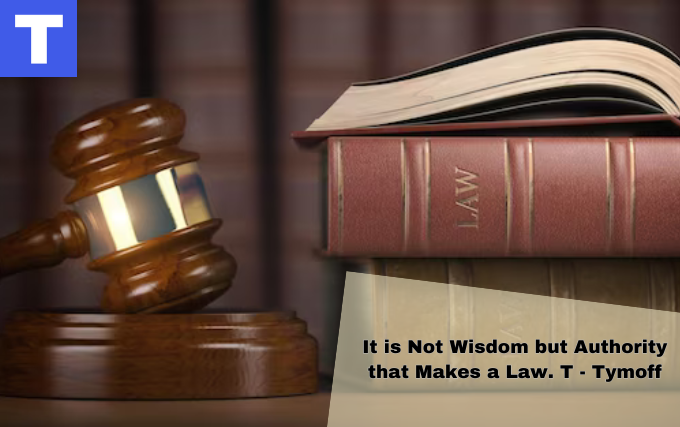In the realm of legal philosophy, the statement “It is Not Wisdom but Authority that Makes a Law. T – Tymoff has sparked considerable debate. This notion challenges conventional beliefs about the nature and foundation of law, raising essential questions about the roles of wisdom and authority in the legislative process. Understanding this concept requires a deep dive into the nature of law, the sources of legal authority, and the implications of prioritizing authority over wisdom in lawmaking.
Understanding the Concept: Authority vs. Wisdom
The Nature of Law
Law is a system of rules created and enforced through social or governmental institutions to regulate behavior. Its primary purpose is to maintain order, resolve disputes, protect liberties and rights, and establish standards for the conduct of individuals and organizations within a society. Laws are crucial in ensuring a stable and functioning society.
The Role of Wisdom in Lawmaking
Wisdom involves the judicious application of knowledge and experience to make sound decisions. When applied to lawmaking, wisdom implies that legislators use their understanding of justice, fairness, and the common good to craft laws that benefit society as a whole. Wise laws are typically perceived as fair, just, and equitable, reflecting the moral and ethical standards of the time.
The Role of Authority in Lawmaking
Authority, on the other hand, is the legitimate power or right to give orders, make decisions, and enforce obedience. In the context of law, authority refers to the power vested in legislative bodies or figures to create and implement laws. This power is often derived from constitutions, legal precedents, or the mandate given by the electorate in democratic societies.
The Dynamics Between Authority and Wisdom
Historical Perspectives
Historically, the tension between authority and wisdom in lawmaking can be traced back to ancient civilizations. For instance, in ancient Rome, the authority of the emperor often overshadowed the wisdom of the Senate. Similarly, in monarchies, the king’s or queen’s authority typically took precedence over the counsel of wise advisors.
Modern Legal Systems
In contemporary legal systems, the balance between authority and wisdom varies. In democratic societies, elected representatives are granted the authority to make laws, ideally using wisdom and expert advice to inform their decisions. However, this balance is not always perfect, and there are instances where authority prevails over wisdom, leading to laws that may be contentious or controversial.
Implications of Prioritizing Authority Over Wisdom
Legitimacy of Laws
When authority takes precedence over wisdom in lawmaking, the legitimacy of the laws can be called into question. Laws that are perceived as unjust or irrational may face resistance and lack of compliance from the public. This can lead to social unrest and challenges to the rule of law.
Impact on Society
Laws made primarily through the exercise of authority without due consideration of wisdom can have adverse effects on society. Such laws may fail to address the root causes of issues, leading to ineffective or even harmful outcomes. For example, overly harsh penalties for minor offenses may not only fail to deter crime but also contribute to social inequalities and injustices.
The Role of Public Opinion
Public opinion plays a crucial role in the interplay between authority and wisdom. In democratic societies, the electorate can influence lawmaking by voting for representatives who prioritize wisdom in their legislative activities. Public discourse, activism, and advocacy are essential in promoting laws that reflect both authority and wisdom.
Striking a Balance: Authority and Wisdom in Lawmaking
Ensuring Accountability
To strike a balance between authority and wisdom, it is essential to ensure accountability in the legislative process. Elected officials and lawmakers should be held accountable for their decisions, and there should be mechanisms in place to review and challenge laws that are perceived as unjust or unwise.
Encouraging Expert Input
Incorporating expert input and evidence-based research into the lawmaking process can enhance the quality of laws. By relying on the knowledge and experience of experts in various fields, lawmakers can craft laws that are both wise and authoritative.
Promoting Civic Engagement
Encouraging civic engagement and public participation in the legislative process can also help balance authority and wisdom. When citizens are actively involved in lawmaking, their collective wisdom can contribute to more just and equitable laws.
Conclusion
The statement “It is Not Wisdom but Authority that Makes a Law. T – Tymoff highlights a fundamental tension in the legislative process. While authority is necessary to create and enforce laws, wisdom is crucial to ensure that these laws are just, fair, and beneficial to society. Striking a balance between authority and wisdom requires accountability, expert input, and active civic engagement. By understanding and addressing this dynamic, we can work towards a legal system that upholds both the authority and the wisdom necessary for a just and orderly society.
